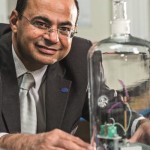There are several initiatives to develop state of the art low carbon energy technologies to capture, generate and store energy from renewable sources. Non-renewable sources of energy especially those derived from fossil fuels are finite, and have been contributing to greenhouse gases. In turn ozone depletion and global warming are on the rise.
There have been recent developments in terms of tidal, wind, solar PV and solar thermal technologies, however there are still challenges in terms of efficiency and amount of useful energy that can be generated versus global demands. In addition, dependency on rare earth materials still exists, thermal efficiency of thermo-fluids (fluids used as a medium of heat energy transfer) have upper thresholds and have implications on the durability of systems. Costs of conventional energy materials such as cobalt and lithium carbonates have been rising sharply since 2015-16. Thermal instability of lithium ion batteries and issues are still significant.
At BU NanoCorr, Energy & Modelling (NCEM) Research Group we are developing novel solar thermal (low carbon) technologies incorporating nano enhanced thermofluids and storage materials.
Research and development in low carbon technology at BU is focused on two main themes; clean growth and future of mobility. For further details and to take part in discussion by providing your comments please click on the link (it takes less than a minute to register).
 Energy: developing reliable renewable energy sources
Energy: developing reliable renewable energy sources Grand Challenges – four missions and an opportunity to input ideas – and a Brexit promise
Grand Challenges – four missions and an opportunity to input ideas – and a Brexit promise










 Beyond Academia: Exploring Career Options for Early Career Researchers – Online Workshop
Beyond Academia: Exploring Career Options for Early Career Researchers – Online Workshop UKCGE Recognised Research Supervision Programme: Deadline Approaching
UKCGE Recognised Research Supervision Programme: Deadline Approaching SPROUT: From Sustainable Research to Sustainable Research Lives
SPROUT: From Sustainable Research to Sustainable Research Lives BRIAN upgrade and new look
BRIAN upgrade and new look Seeing the fruits of your labour in Bangladesh
Seeing the fruits of your labour in Bangladesh ECR Funding Open Call: Research Culture & Community Grant – Apply now
ECR Funding Open Call: Research Culture & Community Grant – Apply now ECR Funding Open Call: Research Culture & Community Grant – Application Deadline Friday 12 December
ECR Funding Open Call: Research Culture & Community Grant – Application Deadline Friday 12 December MSCA Postdoctoral Fellowships 2025 Call
MSCA Postdoctoral Fellowships 2025 Call ERC Advanced Grant 2025 Webinar
ERC Advanced Grant 2025 Webinar Update on UKRO services
Update on UKRO services European research project exploring use of ‘virtual twins’ to better manage metabolic associated fatty liver disease
European research project exploring use of ‘virtual twins’ to better manage metabolic associated fatty liver disease